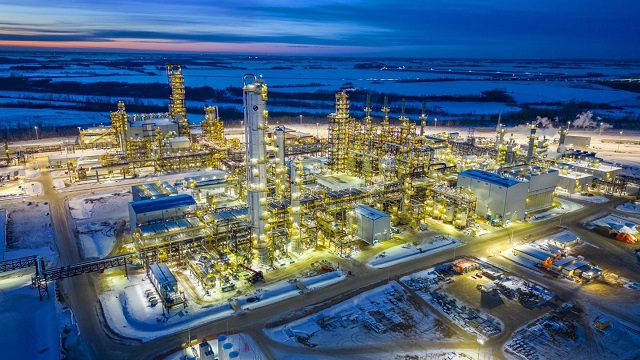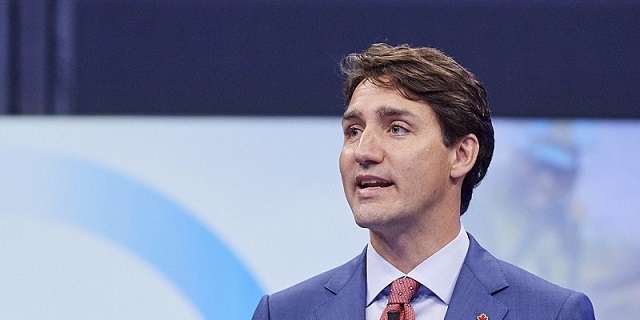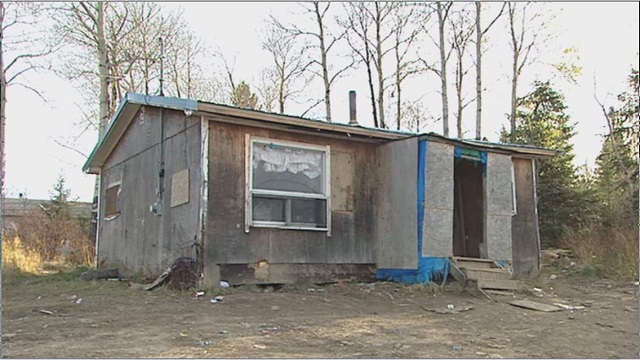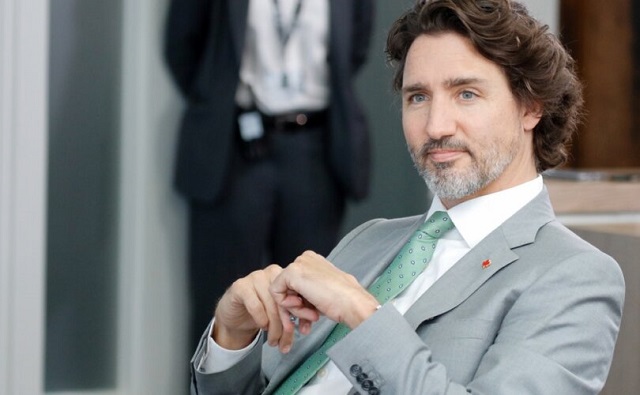Alberta
Masterful storyteller spins yarns on The Bothy

A good story well-told is a beautiful gift. May we suggest treating yourself to The Bothy Storytelling Podcast?
Host Calum Lykan makes his living as a storyteller, and you may even have seen him in real life at a festival, library or school near you, sometimes in his kilt, always in his delightful Scottish brogue.
On his podcast, he shares a mix of captivating tales from the Gaelic and Viking traditions, as well as his own experiences as an immigrant to Canada and an entrepreneur in a creative field. You’ll be entertained, inspired and informed.
Let’s learn a little more about the voice of The Bothy:
Q. What will people get out of listening to your podcast?
A. A good story and fun. I’m Scottish and charming.
Q. What podcasts do you listen to?
A. Anything storytelling-related, such as The Moth and podcasts from guys like Bill Burr. I love the spoken word.
Q. If you could have any guest on your show, who would you ask?
A. Billy Connolly. No explanation required.
Q. Why do you think people enjoy podcasts?
A. They’re easy to access, there’s a good variety, and they offer a change from music.
Q. Write your own epitaph — what would it say?
A. Finally he has shut up.
Q. What has been your favourite episode so far?
A. Viking Storm. It was fun to record.
Be sure to connect with Calum and his podcast on Twitter, Facebook and Instagram.
Over the next several weeks, Todayville will introduce you to members of the Alberta Podcast Network, so you can invite even more Alberta-made podcasts into your ears! You can find The Bothy Storytelling Podcast and dozens of other shows at albertapodcastnetwork.com.
About Alberta Podcast Network
The Alberta Podcast Network, powered by ATB, is on a mission to:
- Help Alberta-based podcasters create podcasts of high quality and reach larger audiences;
- Foster connections among Alberta-based podcasters;
- Provide a powerful marketing opportunity for local businesses and organizations.
Alberta Podcast Network Ltd. is pursuing this mission with funding from ATB Financial and support from other sponsors.
Alberta
Canada’s advantage as the world’s demand for plastic continues to grow

From the Canadian Energy Centre
By Will Gibson
‘The demand for plastics reflects how essential they are in our lives’
From the clothes on your back to the containers for household products to the pipes and insulation in your home, plastics are interwoven into the fabric of day-to-day life for most Canadians.
And that reliance is projected to grow both in Canada and around the world in the next three decades
The Global Plastics Outlook, published by the Paris-based Organization for Economic Co-operation and Development (OECD), forecasts the use of plastics globally will nearly triple by 2060, driven by economic and population growth.
The use of plastics is projected to double in OECD countries like Canada, the United States and European nations, but the largest increases will take place in Asia and Africa.
“The demand for plastics reflects how essential they are in our lives, whether it is packaging, textiles, building materials or medical equipment,” says Christa Seaman, vice-president, plastics with the Chemical Industry Association of Canada (CIAC), which represents Canada’s plastics producers.
She says as countries look to meet climate and sustainability goals, demand for plastic will grow.
“Plastics in the market today demonstrate their value to our society. Plastics are used to make critical components for solar panels and wind turbines. But they also can play a role in reducing weight in transportation or in ensuring goods that are transported have less weight in their packaging or in their products.”
Canada produces about $35 billion worth of plastic resin and plastic products per year, or over five per cent of Canadian manufacturing sales, according to a 2019 report published by the federal government.
Seaman says Canadian plastic producers have competitive advantages that position them to grow as demand rises at home and abroad. In Alberta, a key opportunity is the abundant supply of natural gas used to make plastic resin.
“As industry and consumer expectations shift for production to reduce emissions, Canada, and particularly Alberta, are extremely well placed to meet increased demand thanks to its supply of low-carbon feedstock. Going forward, production with less emissions is going to be important for companies,” Seaman says.
“You can see that with Dow Chemical’s decision to spend $8.8 billion on a net zero facility in Alberta.”
While modern life would not be possible without plastics, the CIAC says there needs to be better post-use management of plastic products including advanced recycling, or a so-called “circular economy” where plastics are seen as a resource or feedstock for new products, not a waste.
Some companies have already started making significant investments to generate recyclable plastics.
For example, Inter Pipeline Ltd.’s $4.3 billion Heartland Petrochemical Complex near Edmonton started operating in 2023. It produces a recyclable plastic called polypropylene from propane, with 65 per cent lower emissions than the global average thanks to the facility’s integrated design.
Achieving a circular economy – where 90 per cent of post-consumer plastic waste is diverted or recycled – would benefit Canada’s economy, according to the CIAC.
A Deloitte study, commissioned by Environment & Climate Change Canada, estimated diverting or reusing 90 per cent of post-consumer plastic waste by 2030 will save $500 million annually while creating 42,000 direct and indirect jobs. It would also cut Canada’s annual CO2 emissions by 1.8 megatonnes.
Right now, about 85 per cent of plastics end up in Canada’s landfills. To reach the 90 per cent diversion rate, Seaman says Canada must improve its infrastructure to collect and process the plastic waste currently being landfilled.
But she also says the industry rather than municipalities need to take responsibility for recycling plastic waste.
“This concept is referred to as extended producer responsibility. Municipalities have the responsibility for managing recycling within a waste management system. Given the competing costs and priorities, they don’t have the incentive to invest into recycling infrastructure when landfill space was the most cost-effective solution for them,” she says.
“Putting that responsibility on the producers who put the products on the market makes the most sense…The industry is adapting, and we hope government policy will recognize this opportunity for Canada to meet our climate goals while growing our economy.”
Alberta
Danielle Smith warns arsonists who start wildfires in Alberta that they will be held accountable

From LifeSiteNews
The Alberta government has created an ad campaign highlighting the fact that most fires are caused by humans and not ‘climate change,’ as many left-leaning politicians claim.
In preparation for the so-called wildfire “season,” Alberta Premier Danielle Smith sternly warned anyone caught starting blazes in her province, including arsonists, that they will face charges and be held fully “liable” for all costs associated with the fires.
“As we approach the wildfire season, it is important to understand that 67% of wildfires in Alberta are started by people,” Smith posted Monday on X.
“If you start a wildfire, you can be charged, fined, and held liable for all costs associated with fighting the wildfire.”
Smith made the comments after last year revealing that most of the wildfires in her province (500 of the 650) were caused by humans and not “climate change,” as has been pushed by the legacy media and opposition politicians.
“All I know is in my province we have 650 fires and 500 of them were human caused,” she said, “so we have to make sure that when people know that when it’s dry out there and we get into forest fire season that they’re being a lot more careful because anytime you end up with an ignition that happens it can have devastating consequences.”
To go along with Smith’s Monday message, the Alberta government has also created an ad campaign highlighting the fact that most fires are caused by humans and not “climate change,” as many left-leaning politicians claim.
As reported by LifeSiteNews last year, Smith ordered arson investigators to look into why some of the wildfires that raged across the vast expanse of the province had “no known cause” shortly after they spread.
During the campaign of Alberta’s 2023 election, Smith, whose United Conservative Party won a majority government, had to pause to deal with many wildfires that suddenly, out of nowhere, ravaged the province. The fires came on suddenly and uncharacteristically considering the heavy snowfall in the province in early March and rain in April.
LifeSiteNews reported that despite the arrest of multiple arsonists, Canada’s mainstream media and the federal government have been pushing a narrative attributing the recent wildfires to “climate change.”
Indeed, in January, LifeSiteNews reported that a man from Quebec admitted to starting 14 forest fires himself. This put a chill to the legacy media’s push that the fires in the province were caused by “climate change.”
However, statistics from Canada’s National Fire Database show that wildfires have gone down in recent years and peaked in 1989.
As for Canadian Prime Minister Justin Trudeau, he has repeatedly used “climate change” and forest fires as a catalyst for propping up his government’s much-maligned carbon tax, which Smith opposes. He has blamed the fires on “climate change.”
A June 2017 peer-reviewed study by two scientists and a veteran statistician confirmed that most of the recent global warming data have been “fabricated by climate scientists to make it look more frightening.”
Trudeau has been calling for increased bans on Canada’s natural resources, of which Alberta has in abundance.
Smith has vowed to fight Trudeau on his attacks against Alberta’s oil and gas industry.
The reduction and eventual elimination of so-called “fossil fuels” and a transition to unreliable “green” energy has also been pushed by the World Economic Forum (WEF), the globalist group behind the socialist “Great Reset” agenda in which Trudeau and some of his cabinet are involved.
-

 Business2 days ago
Business2 days agoBusiness investment key to addressing Canada’s productivity crisis
-

 International2 days ago
International2 days agoBrussels NatCon conference will continue freely after court overturns police barricade
-

 Jordan Peterson2 days ago
Jordan Peterson2 days agoJordan Peterson slams CBC for only interviewing pro-LGBT doctors about UK report on child ‘sex changes’
-

 Business2 days ago
Business2 days agoFederal budget fails to ‘break the glass’ on Canada’s economic growth crisis
-

 Frontier Centre for Public Policy2 days ago
Frontier Centre for Public Policy2 days agoThe Smallwood solution
-

 Alberta1 day ago
Alberta1 day agoDanielle Smith warns arsonists who start wildfires in Alberta that they will be held accountable
-

 Economy2 days ago
Economy2 days agoFederal government remains intransigent on emissions cap despite dire warnings of harm
-

 Addictions2 days ago
Addictions2 days agoLiberal MP blasts Trudeau-backed ‘safe supply’ drug programs, linking them to ‘chaos’ in cities






